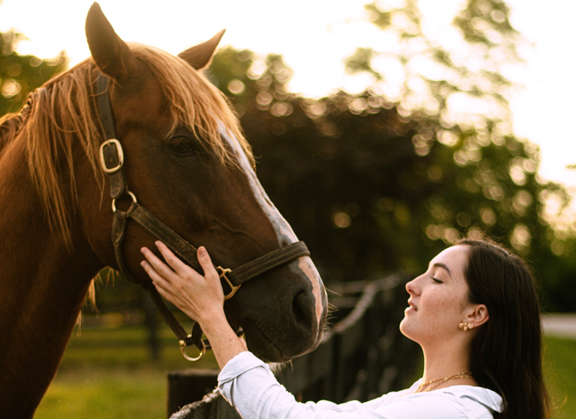By Diana Pikulski
Peyton Skaggs is a junior in the Lewis Honors College of the University of Kentucky studying neuroscience and psychology. She was recently accepted into the University of Kentucky's College of Medicine Early Assurance Program. Somehow, she also found time to start The Working Cat Project (WCP), a nonprofit based out of Lexington, KY. The goal of WCP is to build a network of property owners willing to provide a safe haven for at-risk feral cats as barn cats. The program is nearing the 100 cats-placed milestone and has networked with more than 30 farms in Kentucky. Diana Pikulski caught up with Skaggs to talk about the program/service.
DP: Tell me a little about yourself and how you came to start The Working Cat Project.
PS: I was born and raised here in Kentucky and I love Kentucky. I plan on staying. I am a junior at UK and I will be attending University of Kentucky College of Medicine.
I grew up with adopted pets and got into animal rescue myself when I was around 17. During my senior year in high school, I fostered my first litter of kittens. Once I began college, I started volunteering doing social media for Spay Our Strays of Lexington, Ky, and volunteering at spay/neuter clinics; this was my first experience with feral cats. I continued to volunteer for nearly a year until my cat Jack passed away. I was absolutely devastated but decided to turn my pain into something beautiful to honor his life.
I learned about perils for feral cats the hard way when I found a kitten in my neighborhood but I was unable to catch him. I tried speaking to neighbors to see if anyone was feeding or caring for the kitten and learned the hostility that often exists towards stray cats and how people will even try to kill them. Fast forward a few weeks to Jan. 1, 2020, and I was on a train in France writing my goals for the new year. “Establish a barn cat program” was my number one goal and here we are eight months later.
DP: Where do your cats come from and who goes through the process of catching them and figuring out their best future?
PS: Cats in our program typically come from local shelters or unsafe, outdoor living conditions. These cats are either too feisty or too shy/fearful of people to be adopted as pets. We mostly work with shelters and rarely have to trap cats ourselves. However, we have had a couple of situations where cats were in danger in outdoor colonies and we have had to intervene and trap the cats. Normally, I get a request from a shelter, I book an appointment for the cat to be spayed/neutered, arrange transport to and from the vet appt, arrange for the cat to recover at one of our board member's houses, scan through approved applications, select an application based on specific details such as the number of cats wanted, and lastly do the placement!
DP: How does the placement process work in order to give the cat the best chance of success?
PS: We do a four-week kenneled orientation. So, for four weeks, the cat is kept in a large kennel with an open carrier inside and the cat gets used to the people who will be feeding it and the noise and activity level around them. That way they are likely to stay once you open the kennel. Some of the cats become very friendly and accustomed to people.
DP: In under a year you are about to reach the 100 cats-placed milestone. To what do you attribute your success?
PS: As of Aug. 20, we have placed 98 cats! The majority of cats I have placed have gone to horse farms. So far, we have placed cats everywhere from Prospect, Ky. to Somerset, Ky. Most of our placements are closer to Lexington in Paris and Versailles. I am astonished by the success we have had. I am an extremely passionate person and when I set my mind to something, it gets done. Kentucky is full of animals in need due to the lack of animal cruelty laws. Plus, Kentucky is full of farms and barns and people who care about animals. Making the connection is the key. Plus, WCP has an amazing board of directors.
DP: Do you have a background with horses?
PS: No, unless horse camp as a kid counts. I have always loved animals but have never really ridden. Jorge Vasquez and Sara Holman at Commonwealth Polo Club recently had an event for us and raised over $1,500. Now, I think I might take a few polo lessons! You will have to stay tuned to hear how that turns out.
DP: Do any placement successes really stand out for you?
PS: Trooper is a sweet boy who was found injured and alone in downtown Lexington. He was living in the sewer. We think he's about 10 years old. He keeps the tractor seat warm and watches the sunsets with his human family. Doc, a mostly black cat, was found in rural Ohio and taken to a shelter. He was extremely feral when we first pulled him and now he is totally docile and spends his days on the bales of hay and loving on his new mom, Jill. When a cat who really seemed afraid and alone can become comfortable and secure in his home, it's the best feeling.
DP: What is your most pressing need right now?
PS: We desperately need farms willing to adopt. We provide everything for the kenneling process and ensure the cat is fully vetted prior to reaching their final destination.
To learn more about The Working Cat Project and how you can adopt a working cat, go to https://www.workingcatprojectky.org/adopt or email [email protected].
Diana Pikulski is a partner at Yepsen & Pikulski, and editor of the Thoroughbred Adoption Network.
Not a subscriber? Click here to sign up for the daily PDF or alerts.






